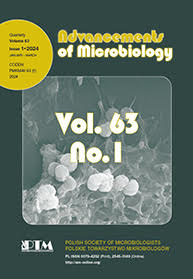1. Wstęp. 2. Kolonizacja nosogardłowa przez Streptococcus pneumoniae jako prekursor choroby. 3. Czynniki chorobotwórczości S. pneumoniae i ich znaczenie w patogenezie zakażeń. 4. Patogeneza zakażenia pneumokokowego. 5. Odporność przeciwpneumokokowa gospodarza. 6. Profilaktyka zakażeń pneumokokowych. 7. Podsumowanie
Abstract: Streptococcus pneumoniae is a major cause of morbidity and mortality worldwide, especially in young children and elderly people. Pneumococcus is the leading cause of non-invasive (pneumonia, sinusitis, otitis media) and invasive (meningitis and bacteriemia/sepsis) pneumococcal disease. The virulence of S. pneumoniae is dependent on numerous factors. Nasopharyngeal carriage of pneumococcus precedes disease and is the source of pneumococcal spread in the community. Although the relationship between carriage and disease is not well understood, a lot of data suggest that local or invasive infection is caused by serotypes which previously bind to the epithelial surface within the respiratory tract. Pneumococcal conjugate vaccines effectively prevent the most serious forms of pneumococcal disease caused by serotypes included in the vaccines and also reduce the risk of nasopharyngeal carriage by those serotypes. Recently, studies were carried out on the immunogenicity and significance of numerous protein virulence factors for the induction of serotype-independent protection against pneumococcal infection.
1. Introduction. 2. Nasopharyngeal colonization by Streptococcus pneumoniae as disease precursor. 3. Virulence factors of Streptococcus pneumoniae and their impact on the development of pneumococcal disease. 4. Pathogenesis of pneumococcal disease. 5. Antipneumococcal host immunity. 6. Pneumococcal vaccines. 7. Summary

